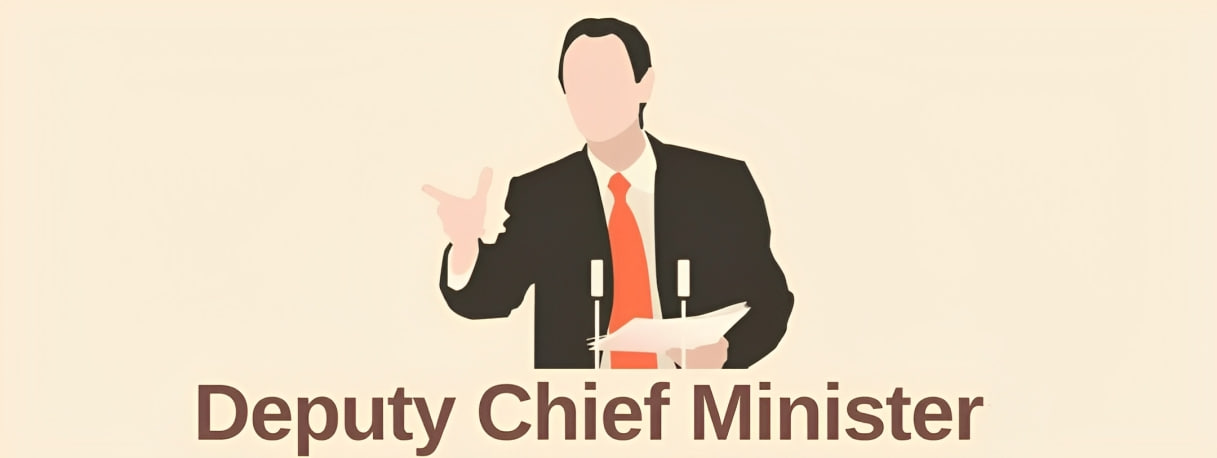Description

Copyright infringement not intended
Context: The post of Deputy Chief Minister is in the news after the result of the Karnataka State Assembly.
Details
Deputy Chief Minister
- The post of Deputy Chief Minister in India is not a constitutional one, but a political arrangement to appease allies or factions within a party.
- The Deputy CM is equivalent to a Cabinet Minister in terms of rank and perks but does not have any specific financial or administrative powers.
- The Deputy CM has to report to the Chief Minister and seek his or her approval for any decision related to his or her portfolio.
- The Deputy CM does not have access to the files or matters that are meant for the Chief Minister.
Appointment and removal
- The appointment and removal of a deputy chief minister is entirely at the discretion of the chief minister.
- The chief minister may appoint more than one deputy chief minister, as is the case in some states like Uttar Pradesh.
- The chief minister may also reshuffle or drop a deputy chief minister at any time, as per their political calculations.
- As of 22 May 2023, 11 out of the 28 states have deputy chief ministers.

Significance of the Post of Deputy Chief Minister
- The position of deputy chief minister is used to bring political stability and strength to a coalition government. It is also a way of rewarding loyal and influential leaders of the ruling party or alliance.
- The Deputy CM acts as the chief minister's deputy and assists them in the administration and governance of the state.
- In some cases, the Deputy CM may act as a bridge between the ruling party and its allies, or between different regions or communities within the state.
- The Deputy CM may be seen as a potential successor to the Chief Minister, or as a check and balance on his or her authority.
- The Deputy CM may have some influence on policy-making and governance, depending on his or her rapport with the Chief Minister and other ministers.
- The Deputy CM may also perform some of the functions of the chief minister in their absence, such as presiding over cabinet meetings, attending official functions, or representing the state in inter-state or national forums.
- However, the deputy chief minister does not have any constitutional authority to act on behalf of the chief minister or to issue any orders or directives without their consent.
Common challenges faced by Deputy Chief Ministers are:
- Lack of clarity and definition of their role and functions
- Potential conflict and rivalry with the Chief Minister or other Ministers
- Lack of autonomy and decision-making power
- Lack of public recognition and visibility
- Lack of accountability and transparency
To overcome these challenges, some possible steps that can be taken are:
- Establishing clear and written guidelines and norms for the appointment, role and functions of Deputy Chief Ministers.
- Ensuring regular and effective communication and coordination between the Chief Minister and the Deputy Chief Minister.
- Giving adequate representation and participation to Deputy Chief Ministers in key policy-making bodies and committees.
- Enhancing public awareness and understanding of the role and contributions of Deputy Chief Ministers.
- Strengthening mechanisms for monitoring and evaluating the performance and outcomes of Deputy Chief Ministers.
Conclusion
- The Deputy Chief Minister post is an important position that can have a significant impact on the governance and development of a state. However, it also poses several challenges and issues that need to be addressed and resolved. By doing so, the Deputy Chief Minister post can become more effective, efficient and meaningful for the people and the state.
|
PRACTICE QUESTION
Q. Consider the following statement about the post of the Deputy Chief Minister.
1. It is mentioned under the Indian Constitution.
2. The post is equivalent to a cabinet minister in terms of rank and perks.
3. The Deputy Chief Minister has access to the files or matters that are meant for the Chief Minister.
Which of the following Statement is/are incorrect?
(A) 1 and 2 only
(B) 2 and 3 only
(C) 1 and 3 only
(D) 1, 2 and 3
Answer: C
Explanation:
Statement 1 is incorrect: The post of Deputy Chief Minister in India is not a constitutional one, but a political arrangement to appease allies or factions within a party.
Statement 2 is correct: The deputy Chief minister is equivalent to a cabinet minister in terms of rank and perks but does not have any specific financial or administrative powers.
Statement 3 is incorrect: The Deputy Chief Minister has to report to the Chief Minister and seek his or her approval for any decision related to his or her portfolio. The Deputy Chief Minister also does not have access to the files or matters that are meant for the Chief Minister.
|

https://indianexpress.com/article/explained/explained-politics/dk-shivakumar-deputy-cm-post-explained-8621053/
















